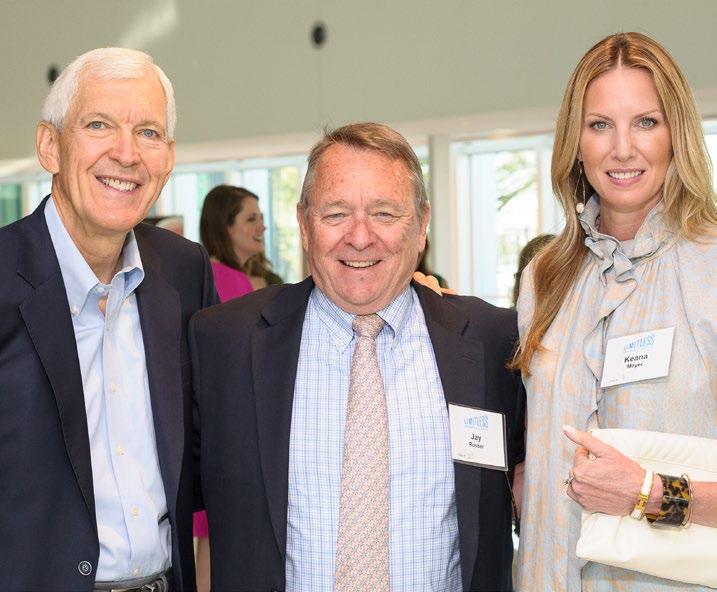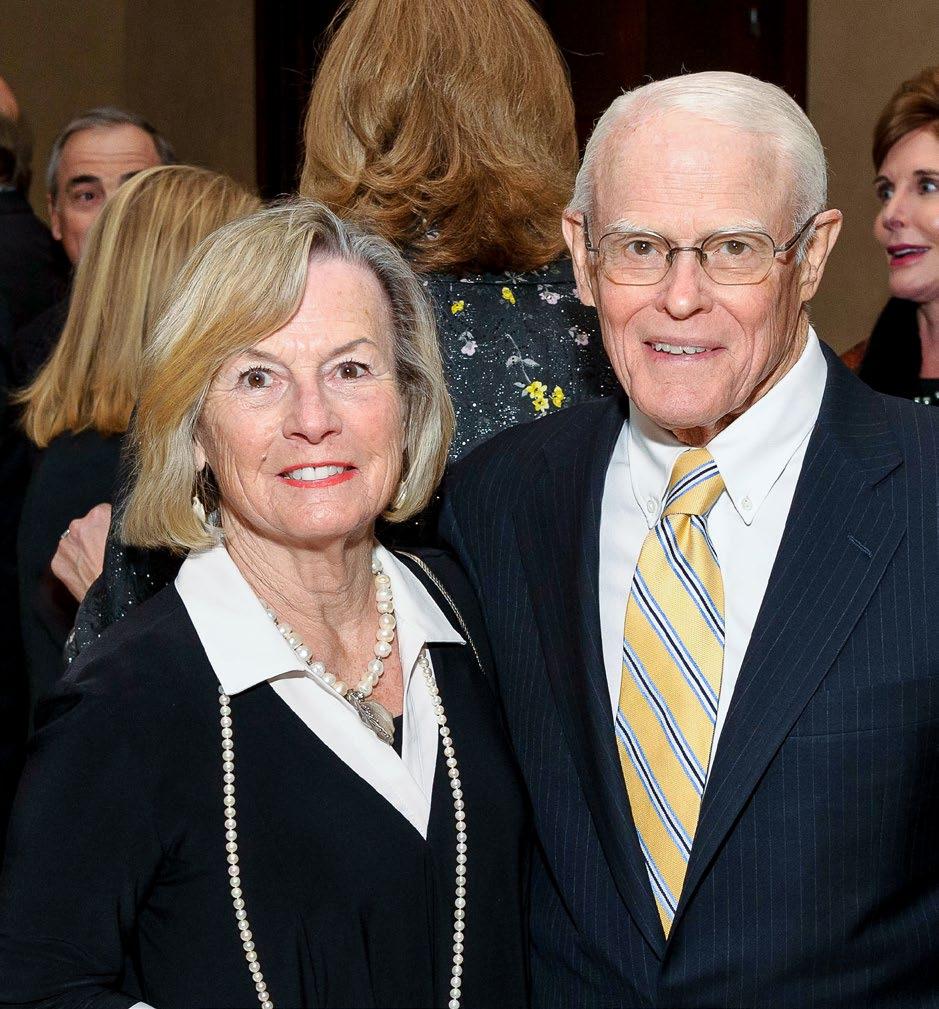A Transformational Investment From Sammons Enterprises
The timely investment will turbocharge the center’s ability to pioneer, test and deliver novel metrics that assess gains in brain health and performance.
The Center for BrainHealth® recently received the largest single corporate donation in its 22-year history: a multi-year gift from Sammons Enterprises, Inc., one of the largest privately-held companies in the U.S.

The gift will power the center’s intellectual capital and the integration of innovative imaging techniques, big data analytics and data visualization to drive discoveries and new protocols to advance brain health breakthroughs.
FUELING THREE AREAS OF WORK
Brain physiology: using cutting-edge imaging techniques to view brain systems as they are working, assess their e ciency and explore the e ects of therapeutics and cognitive trainings over time.
Neuroinformatics: leveraging machine learning and artificial intelligence to achieve personalized brain health that can predict an individual’s brain health trajectory and proactively address early concerns.
Data visualization: creating a visual interface that brings to life the remarkable, dynamic nature of changes in the brain.
SAMMONS BRAINHEALTH IMAGING CENTER AT UTD
In recognition of this transformational investment, the center’s state-of-theart magnetic resonance imaging (MRI) facility has been named the Sammons BrainHealth Imaging Center. This facility houses two 3-Tesla MRI scanners, considered the gold standard for human brain research.
“We are pleased to support the leadingedge, science-backed work of the Center for BrainHealth, whose team is showing the world how to shift focus from problem identification to opportunity capitalization that will lead to healthier outcomes, better quality of life and strong societal benefits,” said Heather Kreager, CEO of Sammons Enterprises.
“We are only beginning to understand and harness the techniques and technologies that are most e ective for each of us, so we must continue tackling brain health with unprecedented focus, determination and funding,” added Sandra Bond Chapman, PhD, Chief Director of the Center for BrainHealth and a distinguished professor in the School of Behavioral and Brain Sciences at UT Dallas. “We are enormously grateful to Sammons Enterprises.”
Limitless BrainHealth Campaign Launches
60% of the $50 million goal has been raised to date.
On April 5, the Center for BrainHealth announced the start of the public phase of the Limitless BrainHealth comprehensive campaign, with a goal to raise $50 million by the end of 2025.
During the campaign’s silent phase, more than 60% of the funding goal was secured, thanks to lead gifts from Jean Ann Brock, the Estate of Janet DeSanders, Beverly and Don Freeman, Marlane Miller, Jennifer and Peter Roberts, Sammons Enterprises, Inc., and several anonymous donors.
Over the past 20-plus years, the center’s proven research and protocols have benefitted everyone from active-duty military service members, veterans and their families, first responders, children and young adults, teachers, Alzheimer’s patients and their caregivers, business and nonprofit leaders, and those with brain injuries, addictions and mental health disorders.
The innovative and inspiring vision of the Limitless BrainHealth campaign is to scale these solutions and elevate public action on brain health.
“BrainHealth is now poised to scale up to a national –even global – level where we can advance our vision around the world,” said Dr. Sandi Chapman, Center
for BrainHealth Chief Director. “Our interventions are providing important breakthroughs in measuring, training and motivating improvements in brain performance across the lifespan. Better brain health is the path to a thriving future.”
Campaign Co-Chairs Eric Bennett and Debbie Francis added, “This campaign o ers each of us the chance to improve our brain and life outcome. Imagine if people took steps early on, to proactively care for their brain as they now do for their heart. It would truly be a life game changer!”
Contributions to the Limitless BrainHealth campaign simultaneously help The University of Texas at Dallas get closer to the $750 million goal of the university’s comprehensive campaign, New Dimensions.

To make a gift in support of the Limitless BrainHealth Campaign, visit centerforbrainhealth.org/give
Everyone Benefits
The campaign focuses on four priority areas:
YOUNG THINKERS: HELPING DEVELOPING MINDS THRIVE


The economic future of our country rests on the ability of today’s students to successfully navigate tomorrow’s challenges and opportunities. Equipped with tools for thinking strategically, deeply and innovatively across academic and social contexts, students with this cognitive learning advantage have a greater chance for success in school and in their future careers.
WARRIORS AND FIRST RESPONDERS: PROTECTING OUR PROTECTORS
Military service members, veterans and first responders face challenges transitioning between the intense nature of their professions and their time o . We are destigmatizing brain health by working with organizations to deliver SMART™ Brain Training, improve transitions, and provide continuity throughout a high-pressure career.

HEALTHY ADULTS: ACHIEVING ACCESS TO LIFELONG BRAIN HEALTH


The BrainHealth Project is the first research-based, online program empowering people to take charge of their brain’s fitness. By leveraging big data analytics to monitor and amplify the e ects of interventions on individual brain health for 120,000+ people over at least a 10-year period, we are building the world’s largest data set documenting discoveries about healthy brains and proven interventions.
SUPPORT FOR ALZHEIMER’S AND CARE PARTNERS
People coping with a recent diagnosis of Alzheimer’s struggle to find messages of hope. Conventional practice has been to focus more on what is lost than the brain skills that may be preserved. The center’s Alzheimer’s Discovery™ program o ers a strengths-based approach that emphasizes the quality of the life still left to live for families adjusting to a diagnosis.
Learn more: centerforbrainhealth.org/give/campaign-priorities
LIMITLESS CELEBRATIONS














“A lot of organizations… work hard on the treatment of brain disease, and the center works closely with a lot of those. What distinguishes the Center [for BrainHealth] is it’s focusing on the health of the brain. It has the chance to change the way all of us – and really the world – think about brain health.”
- TOM LEPPERT, BrainHealth Project Co-Leader
Planned Gift to Optimize Recovery
Brian Conroy is a traumatic brain injury (TBI) survivor and has been a BrainHealth advocate for over a decade – first through the Think Ahead Group, and currently as Co-Chair of the Friends of BrainHealth donor society. Deepening his engagement further, he and his wife Elizabeth have now made a planned gift commitment.

The Brian Conroy Family Opportunity Fund will be a permanent endowment that will support research related to optimizing recovery from brain injuries. This support furthers the center’s mission to build on scientific discoveries – developing and activating evidence-based services to evaluate, monitor and maximize the potential for people of all ages with brain injury. Clinicians and coaches partner with families and their care teams to equip individuals for success in their home, school, work and community environments.
“The brain’s ability to recover and form new connections even years after an injury is fascinating to me,” Brian explained. “We want to leave a legacy that allows other families to benefit from the center’s extraordinary expertise in strengthening brain health, which can occur long after medical treatment has ended.”
Supporting Scientific Leadership
Thanks to generous support from Jean Ann Brock, Dr. Geo Ling is now the Jean Ann Brock BrainHealth Project Co-Leader, a distinction he will carry for at least the next 10 years.


Ling is a neurocritical care physician, a professor of neurology, neurosurgery and anesthesiology, and a retired U.S. Army colonel. With more than 200 peerreviewed publications, he specializes in neurocritical care, traumatic brain injury, post-traumatic stress disorder, memory restoration and prosthetics.
“In order to really take the next step in the brain health revolution, we need strong leadership,” said Brock. “We need the best scientific minds working together
to bring brain health to the public consciousness. Geo is the total package – sharp as they come – and it was important to me that he continues to serve as a co-leader of this groundbreaking endeavor.”
Ling brings crucial experience and credibility to the Project, enhancing its scientific underpinnings. The BrainHealth Project is one of the most significant undertakings for this generation of neuroscientists. In measuring the brain’s health holistically and engaging participants in trainings and habit-building challenges, the Project seeks to achieve for brain health the kind of scalable improvements that past generations accomplished for heart health.
An Ideal Age for Brain Training
Inspiring adolescents to develop complex thinking skills proves challenging for many middle school teachers. But during these formative years, young people have a unique opportunity to strengthen neural connections and prepare for the future.

A recent study led by Dr. Jacquelyn Gamino builds upon decades of BrainHealth research to show that short-term, intensive teacher training yields an exponential impact – shaping both students and teachers, who gain confidence in applying brain-based strategies in the classroom and closing the learning gap, as measured by academic performance.
Dr. Gamino leads BrainHealth’s Adolescent Reasoning Initiative™, a program focused on empowering middle school teachers to harness the science of learning and create organic
opportunities for innovation and deeper-level reasoning.
Published in Frontiers in Psychology, the research reveals new insights about our validated brain training. It illustrates that students connected to this program realize a variety of benefits – including increased initiative, gains across academic areas, and elevated STAAR scores (above the state average).
Thanks to funding from philanthropic individuals, foundations and the state of Texas, the center does not need to charge public schools for this vital training. With a collection of science-based and time-tested teaching tools at their disposal, middle school teachers can inspire adolescent minds to gain foundational thinking skills that will impact the rest of their lives.
Leveraging Technology for Warriors and First Responders
by the Project has been demonstrated to measurably reduce stress and depressive symptoms.
The BrainHealth Mobile App will expand accessibility for Project participants, putting brain health at their fingertips.
One of the first groups to benefit from the app will be military service members – including those starting their military career, those in active duty, and those transitioning out of service – as well as first responders. Our protectors face unique challenges given the highpressure nature of their work and transitions back to civilian life, and the cognitive brain training espoused
Don and Beverly Freeman explained, “When we think of who can benefit from access to BrainHealth’s proven strategies, we believe no group is more deserving than our nation’s warriors, first responders, and their families. There is great opportunity for impact if they can have these tools wherever they are.”
BRAIN HEALTH CAMPAIGN PROGRESS
To learn more about ways you can support BrainHealth's nonprofit mission, contact: Julie Heckmann, Assistant Director of Philanthropy | 972-883-3277 | julie.heckmann@utdallas.edu
